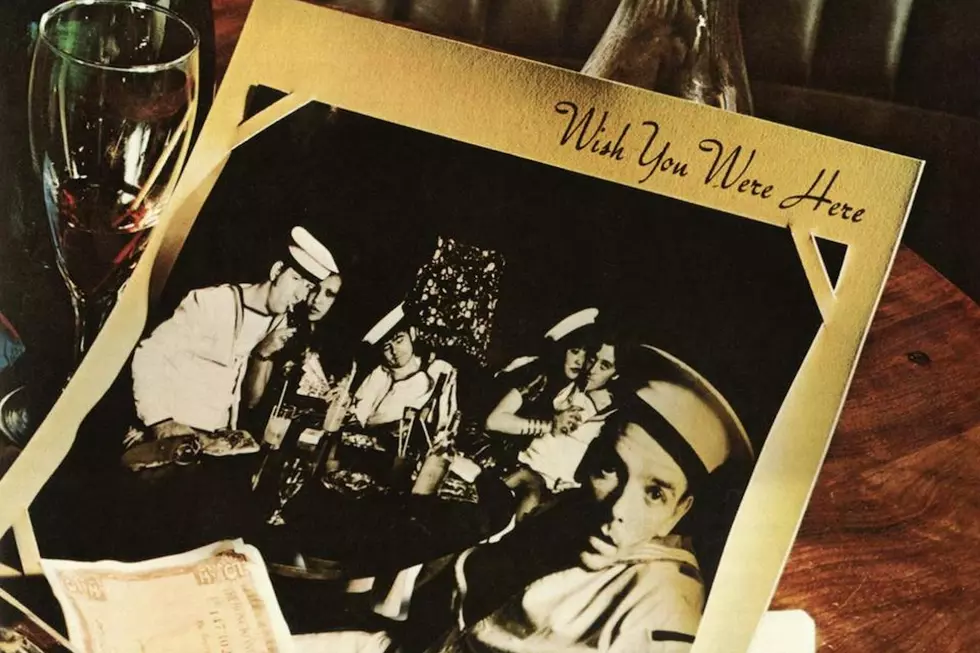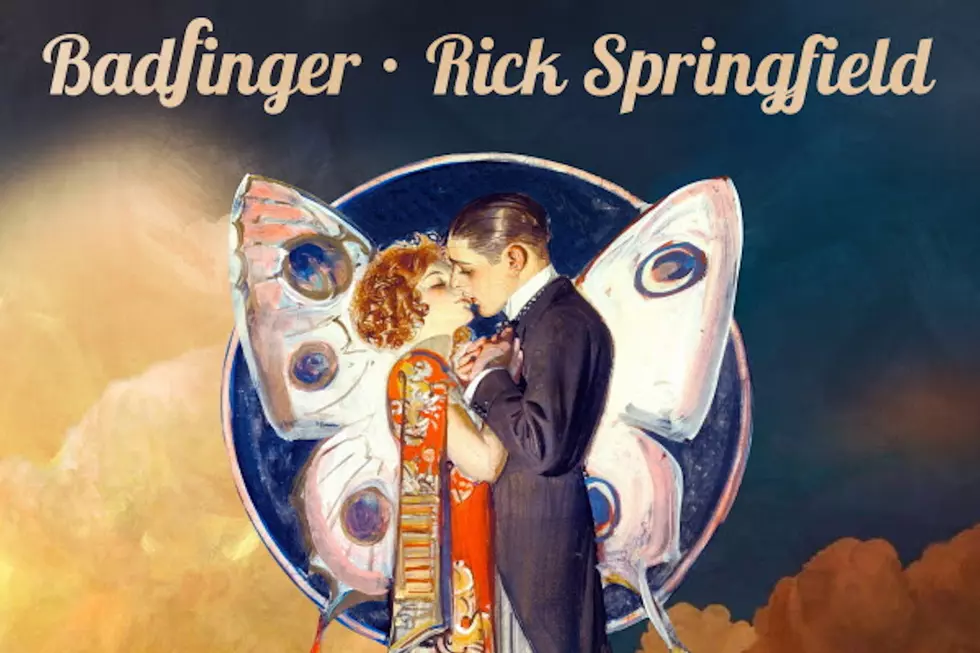
Why Badfinger Fell Apart With the Failure of ‘Wish You Were Here’
Wish You Were Here, the last album to feature all four of Badfinger's classic-era members, works as a prime example of this star-crossed band's woes.
As well-crafted and engaging as it is, this November 1974 project failed to even crack the Billboard Top 100. Within a period of months, group leader Pete Ham had killed himself.
"We didn't get the chance to become ourselves, 'cause that's where the career ended," late founding drummer Mike Gibbins told Badfinger biographer Dan Matovina in 2001. "It's sad, but true. You can imagine the shit we would have done. It would have been nice."
How Badfinger got to this devastating point is a tale filled with unfortunate luck, missed opportunities and outright fraud.
Ham, Tom Evans, Gibbins and bassist Ron Griffith originally founded the group, then known as the Iveys, in Swansea, Wales, in 1968. Signed to Apple Records after Beatles associates Peter Asher and Mal Evans saw the group perform at the Marquee Club in London, the newly renamed Badfinger made an early splash by recording the Paul McCartney-penned "Come and Get It" for the 1969 film Magic Christian. They filled out an 1970 album, titled Magic Christian Music, with additional Iveys material before Griffith was replaced by Joey Molland.
Their association with the Beatles positioned Badfinger to participate in some of the era's most memorable projects – including George Harrison's All Things Must Pass, John Lennon's Imagine and the multi-artist Concert for Bangladesh. Along the way, their own fame grew, too. Badfinger has since sold some 14 million records worldwide. "It's all painted as a tragedy and it wasn't, really," Gibbons told Debbie Catalano of Soundcheck in 1998. "I mean, six, seven, eight albums and people loved it, and it was great. It's not all bad news."
It got worse. Much worse.
Listen to Badfinger Perform 'Just a Chance'
The truth was, Badfinger had signed a disastrous management contract with Stan Polley, one which eventually not only bankrupted the group but ultimately tore it to shreds. Even as they followed "Come and Get It" with a trio of subsequent Top 20 hits in "No Matter What," "Day After Day" and "Baby Blue" into 1972, members of Badfinger were barely scraping by financially.
Even their best intentions went awry. When Badfinger's initial contract with Apple expired, they ostensibly left for the promise of more money at Warner Bros. But Polley's cut only grew. "It was such a great time that I never really paid attention to contracts and stuff," Molland told Reuters in 1997, "and just kind of blindly trusted the business people we had."
Later reported to be associated with the mob, Polley had already established a holding account from which he drew out a monthly stipend for each band member. Polley allegedly grew increasingly brazen, as the group became more profitable.
The Warner Bros. deal amounted to $3 million for six albums, over three years, but Badfinger saw precious little of it, reportedly subsisting on regular $1,000 allowances. Matovina, author of Without You: The Tragic Story of Badfinger and an estate adviser for two of Badfinger's late members, said that Polley was even skimming off songwriting royalties which included Ham's "Without You," a huge hit in 1971 for Harry Nilsson.
Then came the doomed Wish You Were Here, which arrived just as Warner Bros. became suspicious of this financial set up. The label ordered an audit for an account that was supposed to hold approximately $600,000 of advance money in escrow, only to discover that the account had been emptied. The label entered into legal proceedings against Badfinger, promptly removing Wish You Were Here from store shelves at a point when it was initially selling some 25,000 copies a week.
"It killed the album outright," Molland told Rolling Stone in 1989. Worse still, "it broke up the band, and Pete died six months later."
Listen to Badfinger Perform 'Know One Knows'
In retrospect, of course, Badfinger should have pulled away from Polley before moving on with Warner Bros., but Pete Ham has been universally described as a trusting soul. He believed in their manager, despite all evidence to the contrary. "I had flown out to California and was staying in John Lennon's house on the beach," Molland told Creative Loafing in 2005. "While there, I met a lawyer who told me it was common knowledge in the industry that Badfinger was being screwed. It broke my heart. I flew to England to tell the band, but Peter didn't believe it."
Ham ended up quitting Badfinger for a time, but was leveraged back in when Warner Bros. threatened to drop the group entirely if he stayed away. Badfinger completed a half-hearted tour, this time as a five-piece with Bob Jackson, before Molland resigned – frustrated, he's said, because of the Polley situation.
"They, like many others, decided to trust people and take their word on things, not really check into what these things meant," Matovina told Beatlefan magazine in 1998. "They tried to look into different matters, in different ways, but it was ultimately proven they also had bad luck in who they got involved with. It really was too late to escape a lot of the damage done, by the time it all became clear."
At the same time, the dissolution of Apple Records following the Beatles' split had become an entangled legal mess in its own right, which would cause them to be locked out of their pre-Warners royalties until 1985, after Ham and Evans had both passed. They did the only thing they could do: Try to move forward. Gibbins, Evans, Ham and Jackson recorded Head First at the end of the 1974, hoping to bounce back. Instead, Warner Bros. refused to release the album.
A flurry of legal actions surrounded the unhappy Ham. "He had no outlet for his music," Matovina told Big O magazine in 1997. "His career was locked up in lawsuits that he had nothing to do with. He was prevented from playing, putting out music, doing anything. He was shut down, financially and creatively. He was suddenly penniless and had no recourse to do anything."
Desperate and overwhelmed, Pete Ham hung himself in April 1975, after a night of drinking with his long-time bandmate Tom Evans. He cited Badfinger's manager by name in the suicide note: “I will not be allowed to love and trust everybody. This is better.” Then, “P.S. Stan Polley is a soulless bastard. I will take him with me.”
Listen to Badfinger Perform 'Got to Get Out of Here'
Mike Gibbins quit the music business for a time, moving back to Wales, before finally resurfacing a couple of years later on Bonnie Tyler's platinum smash "It's a Heartache." Evans and Joey Molland were left to make sense of Ham's absence, ultimately deciding to try to continue forward without him.
"Joey was getting dissatisfied with the management situation and I'd found out, two albums previous to this time, that we were getting robbed really bad, you know? And I just overlooked it," the late Evans told Apple Daze in 1983. "I just felt, well, the best thing to do is just carry on, you know? But Peter is the type of person who, if he put his trust in someone, he would feel humiliated if he was wrong."
After a period with Natural Gas, a group that served as the opening act on Peter Frampton's career-making Comes Alive tour, Molland rejoined Evans to record Airwaves in 1979. Say No More, which also featured Yes alum Tony Kaye, followed in 1981. But tensions remained, and after an ugly argument – again, reportedly, over money – Evans also killed himself in November 1983.
Neither latter-day Badfinger album had gotten higher than No. 125. Gibbins then died in his sleep, the victim of a brain aneurysm, in 2005. Molland, who later continued with his own version of Badfinger, is the only one who remained from the ill-fated Wish You Were Here sessions.
"It’s frustrating," Molland told the San Diego Reader, before Polley's 2009 death. "You can’t turn back the hands of time. The lawyers couldn’t help; it was contractual interference. The management company couldn’t help. The record company couldn’t help because the last two records hadn’t sold very well. And there was the Warner Bros. lawsuit going on. The manager was hopeless: He freely admits it now. He admits riding around in a limousine in New York and not reading our contracts. It’s just stunning. These people to this day still kind of fob it off to some kind of gray area over there, but the reality of it is that they were directly responsible for it."
How 100 of Rock's Biggest Acts Got Their Names
More From Ultimate Classic Rock









